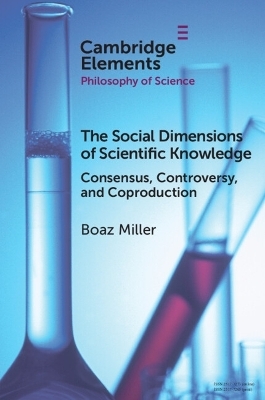
The Social Dimensions of Scientific Knowledge
Consensus, Controversy, and Coproduction
Seiten
2025
Cambridge University Press (Verlag)
978-1-108-70671-1 (ISBN)
Cambridge University Press (Verlag)
978-1-108-70671-1 (ISBN)
- Noch nicht erschienen (ca. Februar 2025)
- Portofrei ab CHF 40
- Auch auf Rechnung
- Artikel merken
This Element explores the social dimensions of scientific knowledge, focusing on its social nature, its development, and its real-world application. It explores the conditions for consensus in a scientific community, how to handle scientific dissent, and how epistemic and social elements mutually interact to coproduce scientific knowledge.
This Element is about the social dimensions of scientific knowledge. The first section asks in what ways scientific knowledge is social. The second section develops a conception of scientific knowledge that accommodates the insights of the first section, and is consonant with mainstream thinking about knowledge in analytic epistemology. The third section asks under what conditions we can tell, in the real world, that a consensus in a scientific community amounts to shared scientific knowledge, as characterized in the second section, and how to deal with scientific dissent. The fourth section reviews the ways epistemic and social elements mutually interact to coproduce scientific knowledge. This Element engages with literature from philosophy of science and social epistemology, especially social epistemology of science, as well as Science, Technology, and Society (STS), and analytic epistemology. The Element focuses on themes and debates that date from the start of the second millennium.
This Element is about the social dimensions of scientific knowledge. The first section asks in what ways scientific knowledge is social. The second section develops a conception of scientific knowledge that accommodates the insights of the first section, and is consonant with mainstream thinking about knowledge in analytic epistemology. The third section asks under what conditions we can tell, in the real world, that a consensus in a scientific community amounts to shared scientific knowledge, as characterized in the second section, and how to deal with scientific dissent. The fourth section reviews the ways epistemic and social elements mutually interact to coproduce scientific knowledge. This Element engages with literature from philosophy of science and social epistemology, especially social epistemology of science, as well as Science, Technology, and Society (STS), and analytic epistemology. The Element focuses on themes and debates that date from the start of the second millennium.
Introduction; 1. The social dimensions of scientific knowledge; 2. A conception of individual and collective scientific knowledge; 3. Assessing a scientific consensus for knowledge and dealing with dissent; 4. The interaction of epistemic and social elements in the coproduction of knowledge; References.
| Erscheinungsdatum | 03.01.2025 |
|---|---|
| Reihe/Serie | Elements in the Philosophy of Science |
| Zusatzinfo | Worked examples or Exercises |
| Verlagsort | Cambridge |
| Sprache | englisch |
| Themenwelt | Geisteswissenschaften ► Philosophie ► Erkenntnistheorie / Wissenschaftstheorie |
| Geisteswissenschaften ► Philosophie ► Metaphysik / Ontologie | |
| Naturwissenschaften | |
| ISBN-10 | 1-108-70671-1 / 1108706711 |
| ISBN-13 | 978-1-108-70671-1 / 9781108706711 |
| Zustand | Neuware |
| Informationen gemäß Produktsicherheitsverordnung (GPSR) | |
| Haben Sie eine Frage zum Produkt? |
Mehr entdecken
aus dem Bereich
aus dem Bereich
die Grundlegung der modernen Philosophie
Buch | Softcover (2023)
C.H.Beck (Verlag)
CHF 25,20
Buch | Softcover (2023)
Reclam, Philipp (Verlag)
CHF 9,80
die Evolution des Geistes
Buch | Softcover (2025)
Suhrkamp (Verlag)
CHF 41,95

![Was heißt Denken?. Vorlesung Wintersemester 1951/52. [Was bedeutet das alles?] - Martin Heidegger](/media/113619842)
